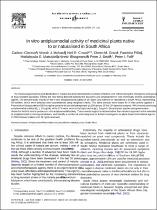 ResearchSpace
ResearchSpace
In vitro antiplasmodial activity of medicinal plants native to or naturalised in South Africa
JavaScript is disabled for your browser. Some features of this site may not work without it.
- ResearchSpace
- →
- Research Publications/Outputs
- →
- Journal Articles
- →
- View Item
| dc.contributor.author |
Clarkson, C

|
en_US |
| dc.contributor.author |
Maharaj, VJ

|
en_US |
| dc.contributor.author |
Crouch, NR

|
en_US |
| dc.contributor.author |
Grace, WM

|
en_US |
| dc.contributor.author |
Pillay, P

|
en_US |
| dc.contributor.author |
Matsabisa, MG

|
en_US |
| dc.contributor.author |
Bhagwandin, N

|
en_US |
| dc.contributor.author |
Smith, PJ

|
en_US |
| dc.contributor.author |
Folb, PI

|
en_US |
| dc.date.accessioned | 2007-01-12T10:23:37Z | en_US |
| dc.date.accessioned | 2007-06-07T10:09:50Z | |
| dc.date.available | 2007-01-12T10:23:37Z | en_US |
| dc.date.available | 2007-06-07T10:09:50Z | |
| dc.date.issued | 2004-06 | en_US |
| dc.identifier.citation | Clarkson, C, et al. 2004. In vitro antiplasmodial activity of medicinal plants native to or naturalised in South Africa. Journal of Ethnopharmacology, vol 92, 03 February, pp 177-191. | en_US |
| dc.identifier.issn | 0378-8741 | en_US |
| dc.identifier.uri | http://hdl.handle.net/10204/1395 | en_US |
| dc.identifier.uri | http://hdl.handle.net/10204/1395 | |
| dc.description.abstract | The increasing prevalence and distribution of malaria has been attributed to a number of factors, one of them being the emergence and spread of drug resistant parasites. Efforts are now being directed towards the discovery and development of new chemically diverse antimalarial agents. The present study reports on the in vitro antiplasmodial activity of 134 plant taxa native to or naturalised in South Africa, representing 54 families, which were selected semi-quantitatively using weighted criteria. The plant extracts were tested for in vitro activity against a Plasmodium falciparum strain D10 using the parasite lactate dehydrogenase (pLDH) assay. Of the 134 species assayed, 49% showed promising antiplasmodial activity (IC50 less or equal to 10_g/ml), while 17% were found to be highly active (IC50 less or equal to 5_g/ml). Several plant species and genera were shown for the first time to possess in vitro antiplasmodial activity. These results support a rational rather than random approach to the selection of antiplasmodial screening candidates, and identify a number of promising taxa for further investigation as plant-based antimalarial agents. | en_US |
| dc.format.extent | 113798 bytes | en_US |
| dc.format.mimetype | application/pdf | en_US |
| dc.language.iso | en | en_US |
| dc.publisher | Elsevier Science Ireland Ltd | en_US |
| dc.rights | Copyright: 2004 Elsevier Ireland Ltd. | en_US |
| dc.subject | Malaria | en_US |
| dc.subject | In-vitro antiplasmodial activities | en_US |
| dc.subject | Plasmodium falciparum | en_US |
| dc.subject | Ethnomedicinal plants | en_US |
| dc.subject | South Africa | en_US |
| dc.subject | Plant sciences | en_US |
| dc.subject | Pharmacology | en_US |
| dc.title | In vitro antiplasmodial activity of medicinal plants native to or naturalised in South Africa | en_US |
| dc.type | Article | en_US |
| dc.identifier.apacitation | Clarkson, C., Maharaj, V., Crouch, N., Grace, W., Pillay, P., Matsabisa, M., ... Folb, P. (2004). In vitro antiplasmodial activity of medicinal plants native to or naturalised in South Africa. http://hdl.handle.net/10204/1395 | en_ZA |
| dc.identifier.chicagocitation | Clarkson, C, VJ Maharaj, NR Crouch, WM Grace, P Pillay, MG Matsabisa, N Bhagwandin, PJ Smith, and PI Folb "In vitro antiplasmodial activity of medicinal plants native to or naturalised in South Africa." (2004) http://hdl.handle.net/10204/1395 | en_ZA |
| dc.identifier.vancouvercitation | Clarkson C, Maharaj V, Crouch N, Grace W, Pillay P, Matsabisa M, et al. In vitro antiplasmodial activity of medicinal plants native to or naturalised in South Africa. 2004; http://hdl.handle.net/10204/1395. | en_ZA |
| dc.identifier.ris | TY - Article AU - Clarkson, C AU - Maharaj, VJ AU - Crouch, NR AU - Grace, WM AU - Pillay, P AU - Matsabisa, MG AU - Bhagwandin, N AU - Smith, PJ AU - Folb, PI AB - The increasing prevalence and distribution of malaria has been attributed to a number of factors, one of them being the emergence and spread of drug resistant parasites. Efforts are now being directed towards the discovery and development of new chemically diverse antimalarial agents. The present study reports on the in vitro antiplasmodial activity of 134 plant taxa native to or naturalised in South Africa, representing 54 families, which were selected semi-quantitatively using weighted criteria. The plant extracts were tested for in vitro activity against a Plasmodium falciparum strain D10 using the parasite lactate dehydrogenase (pLDH) assay. Of the 134 species assayed, 49% showed promising antiplasmodial activity (IC50 less or equal to 10_g/ml), while 17% were found to be highly active (IC50 less or equal to 5_g/ml). Several plant species and genera were shown for the first time to possess in vitro antiplasmodial activity. These results support a rational rather than random approach to the selection of antiplasmodial screening candidates, and identify a number of promising taxa for further investigation as plant-based antimalarial agents. DA - 2004-06 DB - ResearchSpace DP - CSIR KW - Malaria KW - In-vitro antiplasmodial activities KW - Plasmodium falciparum KW - Ethnomedicinal plants KW - South Africa KW - Plant sciences KW - Pharmacology LK - https://researchspace.csir.co.za PY - 2004 SM - 0378-8741 T1 - In vitro antiplasmodial activity of medicinal plants native to or naturalised in South Africa TI - In vitro antiplasmodial activity of medicinal plants native to or naturalised in South Africa UR - http://hdl.handle.net/10204/1395 ER - | en_ZA |





